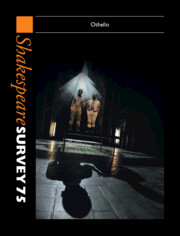Book contents
- Shakespeare Survey 75
- Shakespeare Survey
- Shakespeare Survey
- Copyright page
- Editor’s Note
- Contributors
- Contents
- Illustrations
- Understanding Iago, An Italian Film Adaptation Of Othello: Clientelism, Corruption, Politics
- Circumventing Marginality: The Curious Case Of India’s Othello Screen Adaptations
- Othello’s Kin: Legacy, Belonging And The Fortunes Of The Moor
- ‘More Fair Than Black’: Othellos On British Radio
- ‘This Fair Paper’: Othello And The Artists’ Book
- Othello: A Dialogue With The Built Environment
- ‘[A] Maid Called Barbary’: Othello, Moorish Maidservants And The Black Presence In Early Modern England
- ‘The Moor’s Abused By Some Most Villainous Knave, Some Base Notorious Knave, Some Scurvy Fellow’: Legal Spaces, Racial Trauma And Shakespeare’s The Tragedy Of Othello, The Moor Of Venice
- Ben Jonson’s Sejanus And Shakespeare’s Othello: Two Plays Performed By The King’s Men In 1603
- Iago And The Clown: Disassembling The Vice In Othello
- Pitying Desdemona In Folio Othello: Race, Gender And The Willow Song
- Desdemona’s Honest Friend
- Suffering Ecstasy: Othello And The Drama Of Displacement
- Othello’s Sympathies: Emotion, Agency And Identification
- Warning The Stage: Shakespeare’s Mid-Scene Entrance Conventions
- Looking For Perdita In Ali Smith’s Summer
- Grafted To The Moor: Anglo-Spanish Dynastic Marriage And Miscegenated Whiteness In The Winter’s Tale
- Rhyme, History And Memory In A Mirror For Magistrates And Henry VI
- ‘Bad’ Love Lyrics And Poetic Hypocrisy From Gascoigne To Benson’s Shakespeare
- Viola’s Telemachy
- New Analogical Evidence For Cymbeline’s Folkloric Composition In The Medieval Icelandic Ála Flekks Saga
- ‘But When Extremities Speak’: Harley Granville-Barker, Coriolanus, The World Wars And The State Of Exception
- Shakespeare Performances in England, 2021
- Shakespeare Performances in England, 2021
- Professional Shakespeare Productions In The British Isles, January–December 2020
- The Year’s Contribution To Shakespeare Studies
- Abstracts Of Articles In Shakespeare Survey 75
- Index
Rhyme, History And Memory In A Mirror For Magistrates And Henry VI
Published online by Cambridge University Press: 24 August 2022
- Shakespeare Survey 75
- Shakespeare Survey
- Shakespeare Survey
- Copyright page
- Editor’s Note
- Contributors
- Contents
- Illustrations
- Understanding Iago, An Italian Film Adaptation Of Othello: Clientelism, Corruption, Politics
- Circumventing Marginality: The Curious Case Of India’s Othello Screen Adaptations
- Othello’s Kin: Legacy, Belonging And The Fortunes Of The Moor
- ‘More Fair Than Black’: Othellos On British Radio
- ‘This Fair Paper’: Othello And The Artists’ Book
- Othello: A Dialogue With The Built Environment
- ‘[A] Maid Called Barbary’: Othello, Moorish Maidservants And The Black Presence In Early Modern England
- ‘The Moor’s Abused By Some Most Villainous Knave, Some Base Notorious Knave, Some Scurvy Fellow’: Legal Spaces, Racial Trauma And Shakespeare’s The Tragedy Of Othello, The Moor Of Venice
- Ben Jonson’s Sejanus And Shakespeare’s Othello: Two Plays Performed By The King’s Men In 1603
- Iago And The Clown: Disassembling The Vice In Othello
- Pitying Desdemona In Folio Othello: Race, Gender And The Willow Song
- Desdemona’s Honest Friend
- Suffering Ecstasy: Othello And The Drama Of Displacement
- Othello’s Sympathies: Emotion, Agency And Identification
- Warning The Stage: Shakespeare’s Mid-Scene Entrance Conventions
- Looking For Perdita In Ali Smith’s Summer
- Grafted To The Moor: Anglo-Spanish Dynastic Marriage And Miscegenated Whiteness In The Winter’s Tale
- Rhyme, History And Memory In A Mirror For Magistrates And Henry VI
- ‘Bad’ Love Lyrics And Poetic Hypocrisy From Gascoigne To Benson’s Shakespeare
- Viola’s Telemachy
- New Analogical Evidence For Cymbeline’s Folkloric Composition In The Medieval Icelandic Ála Flekks Saga
- ‘But When Extremities Speak’: Harley Granville-Barker, Coriolanus, The World Wars And The State Of Exception
- Shakespeare Performances in England, 2021
- Shakespeare Performances in England, 2021
- Professional Shakespeare Productions In The British Isles, January–December 2020
- The Year’s Contribution To Shakespeare Studies
- Abstracts Of Articles In Shakespeare Survey 75
- Index
Summary
This question is posed by the authors of A Mirror for Magistrates, the enormously popular verse history collection that came out in increasingly expanded editions from the 1550s onwards. In the collection, guilty or unfortunate historical figures make didactic orations to the poets who transcribe them, in short poems interspersed with practical and theoretical prose discussions between the poets themselves (Baldwin, Ferrers, Sackville and others). The question quoted above appears in the poem ventriloquizing Collingbourne, a citizen in the time of Richard III ‘cruelly executed for making a foolishe rime’.1 The poem emotively illustrates the risks of satirizing authority figures in verse. The foolish rhyme itself appears to have been merely a couplet: ‘The Cat, the Rat, and Lovel our Dog, / Do rule al England, under a Hog’ (fol. C.xliii). As the reanimated Collingbourne explains, the cat is Catesby, the rat is Ratcliffe, and the dog is Lovell. Richard III himself is the hog, partly because it is the animal depicted on his device or badge, and partly – as the speaker somewhat disappointingly admits – ‘to ryme’ (fol. C.xliiv). Overall, the poem reads as a manifesto for freedom of ideas in verse, and a lament for the loss of satirical licence since the ancients. It also raises some questions about rhyme and historical truth.
- Type
- Chapter
- Information
- Shakespeare Survey 75Othello, pp. 256 - 264Publisher: Cambridge University PressPrint publication year: 2022



